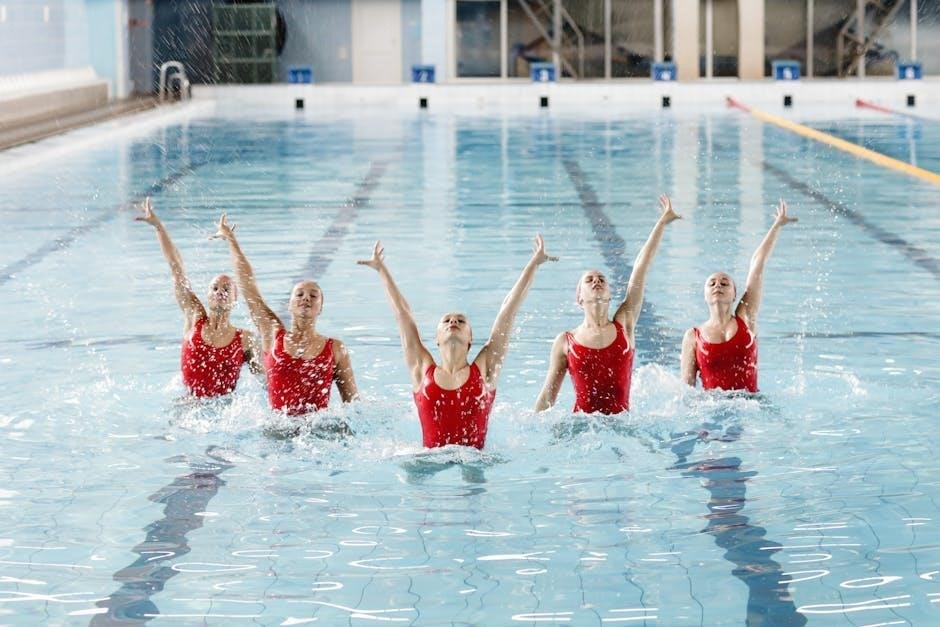The Potato Olympics is an innovative educational activity where students create and train potato athletes for fun, Olympic-style events, fostering creativity, numeracy, and teamwork in the classroom.
Overview of the Potato Olympics Concept
The Potato Olympics is a creative, educational activity where students design and train potato athletes for fun, Olympic-style events. It combines learning with play, promoting numeracy, teamwork, and problem-solving skills. Students create ramps, participate in dance spins, and design posters, fostering creativity. The concept is flexible, adaptable to various age groups, and aligns with curriculum goals; The Potato Olympics Event Ideas PDF provides a comprehensive guide, including event sheets, score sheets, and tips for organizing a successful, engaging competition that encourages healthy competition and student engagement.
Importance of Engagement and Fun in Learning
Engagement and fun are essential for effective learning, as they increase student motivation and participation. The Potato Olympics is a prime example, transforming learning into an interactive and enjoyable experience. By designing ramps, spinning potatoes, and creating posters, students develop problem-solving and creativity skills in a playful environment. This approach makes complex concepts accessible and fosters teamwork, communication, and healthy competition. Fun learning experiences like the Potato Olympics enhance students’ enthusiasm and involvement, creating a positive association with education and encouraging active participation in the classroom.
Main Potato Olympics Events
The Potato Olympics features exciting events like the Running Ramp, Dance Spin, and Opening Ceremony, designed to challenge students creatively while making learning fun and interactive.
Running Event: Creating a Ramp for Potato Athletes
The Running Event is a highlight of the Potato Olympics, where students design and build ramps for their potato athletes to roll down. Using materials like books, cardboard, or wooden blocks, students test their creativity and engineering skills. The goal is to create a ramp that allows the potato to travel the farthest distance, measured using a tape measure. This event not only fosters teamwork but also introduces concepts of physics and geometry in a fun, interactive way. Students learn to calculate distances, compare results, and refine their designs for better performance, making it both educational and entertaining.
Dance Spin: A Fun and Creative Challenge
The Dance Spin event is a delightful and imaginative challenge where students design their potato athletes to perform a spinning dance. Potatoes are decorated with creative features like arms or legs and placed on a spinning surface. Students test how long their potato can spin or how balanced it stays. This activity encourages problem-solving and teamwork while adding a fun, artistic element to the Potato Olympics. It’s a unique way to blend creativity with physics, making learning both enjoyable and interactive for all participants.
Opening Ceremony: Designing Posters for Potato Athletes
The Opening Ceremony is a vibrant start to the Potato Olympics, where students design colorful posters for their potato athletes. This creative activity sparks excitement and sets the tone for the event. Students personalize their posters with names, decorations, and themes, showcasing their artistic skills. The ceremony often includes introductions of the athletes, fostering public speaking and presentation skills. It’s a lively way to engage the entire class, creating a festive atmosphere and building anticipation for the competitions ahead.

Designing and Testing Potato Olympics Events
Designing and testing Potato Olympics events involves creating ramps, measuring distances, and refining challenges. These activities encourage creativity, problem-solving, and numeracy skills while ensuring fun and engaging learning experiences.
Building Ramps for the Running Event
Building ramps for the running event is a core activity in the Potato Olympics. Students use materials like cardboard, books, or wooden blocks to create ramps for their potato athletes. The goal is to design a ramp that allows the potato to roll the farthest distance. This activity encourages problem-solving and creativity while teaching basic engineering and physics concepts. By testing and refining their ramp designs, students develop critical thinking skills and learn about measurement and distance calculation in a fun, interactive way.
Measuring and Recording Distances
Measuring and recording distances is a key part of the Potato Olympics, particularly in the running event. Students use tape measures to calculate how far their potato travels, fostering numeracy skills and an understanding of measurement. This activity encourages accuracy and data recording, while also promoting healthy competition as students compare results. By tracking progress, students can refine their ramp designs, developing problem-solving skills and teamwork. This hands-on approach makes learning fun and interactive, aligning with curriculum goals in a creative way.
Testing and Refining Event Designs
Testing and refining event designs is crucial for ensuring fairness and fun in the Potato Olympics. Students experiment with their creations, identifying areas for improvement, such as ramp angles or potato designs. Through trial and error, they refine their ideas, enhancing performance and creativity. This iterative process fosters critical thinking, teamwork, and problem-solving skills. By addressing challenges and incorporating feedback, students develop well-designed events that are both engaging and effective, ensuring a successful and enjoyable competition for all participants.

Educational Benefits of Potato Olympics
Fosters creativity and numeracy, encourages teamwork, and builds problem-solving skills; Integrates literacy and numeracy, making learning interactive and fun for students.
Developing Numeracy Skills Through Measurement
The Potato Olympics enhances numeracy skills through hands-on measurement activities. Students use rulers and tape measures to calculate distances, fostering an understanding of units and conversions. Recording results on score sheets encourages data analysis and comparison, while designing ramps and tracking potato athletes’ performance introduces basic physics concepts. This interactive approach makes learning math engaging and fun, as students apply numerical skills to real-world challenges in a creative and collaborative environment.
Encouraging Teamwork and Collaboration
The Potato Olympics fosters teamwork and collaboration as students work in groups to design and participate in events. By sharing ideas and responsibilities, students develop essential communication and problem-solving skills. Collaborative tasks, such as building ramps or decorating potato athletes, encourage mutual support and creativity. This interactive approach helps students learn to rely on each other’s strengths, promoting a sense of unity and shared achievement while making learning fun and engaging for all participants.
Building Creativity and Problem-Solving Skills
The Potato Olympics inspires creativity and problem-solving as students design ramps, measure distances, and innovate solutions for their potato athletes. Through hands-on challenges like the Running Event and Dance Spin, students brainstorm unique ideas and test their designs, fostering critical thinking and adaptability. These activities encourage experimentation, helping students develop creative strategies to overcome obstacles and achieve success in a fun, interactive learning environment that celebrates imagination and resourcefulness.

Organizing a Potato Olympics Event
Organize a Potato Olympics event by gathering materials, setting up event stations, and using score sheets to track progress. Ensure a fun, engaging, and interactive experience for students.
Materials and Supplies Needed
To host a Potato Olympics, gather essential materials like potatoes, markers, tape measures, ramps, and craft supplies. Additional items include score sheets, medals, and event station setups. Ensure materials are adaptable for various age groups and abilities. Creativity is key, so encourage students to personalize their potato athletes. The supplies promote hands-on learning, teamwork, and fun, making the Potato Olympics an engaging and interactive experience for all participants. Proper organization of materials ensures smooth event execution and maximum student engagement.
Setting Up Event Stations in the Classroom
Organize event stations around the classroom, each featuring a unique Potato Olympics challenge. Use tables or designated areas for activities like the running ramp or dance spin. Ensure materials are easily accessible and stations are clearly labeled. Arrange the layout to promote movement and engagement among students. Provide instructions and examples at each station to guide participants. Encourage students to rotate through stations, fostering variety and inclusivity. Proper setup ensures a smooth, interactive, and enjoyable experience for all participants.
Using Score Sheets for Tracking Progress
Score sheets are essential for managing Potato Olympics events, allowing teachers to track student progress and record results at each station. These sheets, provided in the PDF guide, help maintain organization and fairness. They can be customized to fit specific events, ensuring accurate scoring and clear communication of results. Score sheets also enable students to monitor their achievements, fostering healthy competition and engagement. This tool simplifies the process of managing multiple events and participants, making it easier to celebrate successes and maintain a fun, structured environment for all involved.

Extending Learning with Additional Activities
The Potato Olympics event ideas PDF offers activities like literacy tasks, athlete biographies, and closing ceremonies, enhancing creativity, problem-solving, and engagement while integrating numeracy and literacy challenges.
Integrating Literacy and Numeracy Activities
The Potato Olympics event ideas PDF includes literacy and numeracy activities, such as descriptive writing, athlete biographies, and distance measurements. Students develop writing skills by creating athlete profiles and event descriptions, while measuring and recording distances enhances numeracy. These activities integrate seamlessly into the curriculum, making learning interactive and engaging. The PDF provides customizable templates for all age groups, ensuring inclusivity and diverse learning opportunities. This approach fosters creativity, problem-solving, and teamwork while aligning with educational goals.
Creating Athlete Biographies and Team Recordings
Students craft imaginative biographies for their potato athletes, detailing personalities, backgrounds, and event goals. This activity enhances literacy skills and encourages creativity. Team recordings, such as athlete profiles and event summaries, add a personal touch to the competition. The Potato Olympics PDF provides templates for these activities, making it easy for students to document their journey. This engaging approach fosters storytelling and documentation skills while adding depth to the fun and interactive learning experience.
Hosting a Closing Ceremony and Awarding Medals
The Potato Olympics concludes with a closing ceremony, celebrating students’ achievements and teamwork. Printable medals from the PDF are awarded to winners, fostering a sense of accomplishment; Students reflect on their experiences, sharing highlights and lessons learned. This joyful event emphasizes sportsmanship and camaraderie, providing a memorable end to the competition while reinforcing the value of participation and creativity.

Encouraging Student Participation
Allowing students to design their own Potato Olympics events fosters creativity and ownership, encouraging active engagement and teamwork while developing critical thinking and problem-solving skills.
Allowing Students to Design Their Own Events
Empowering students to create their own Potato Olympics events enhances creativity and engagement. They can invent unique challenges, such as potato relays or balancing acts, using everyday materials. This approach encourages critical thinking and innovation while aligning with curriculum goals. Teachers can provide guidelines but allow flexibility for imaginative designs, fostering a sense of ownership and excitement among participants. This creative freedom ensures the event is both educational and enjoyable, catering to diverse student interests and abilities.
Recognizing and Rewarding Student Achievement
Awarding medals, certificates, or verbal praise motivates students and celebrates their efforts. A closing ceremony with medals and recognition fosters pride and a sense of accomplishment. Score sheets track progress, while personalized rewards encourage creativity and perseverance. This positive reinforcement boosts confidence, teamwork, and sportsmanship, creating a supportive environment for all participants to shine. Recognizing achievements makes the Potato Olympics a memorable and rewarding experience for students of all ages and abilities.
Encouraging Student Roles: Athletes, Judges, and Commentators
Students can take on roles as athletes, judges, or commentators, enhancing engagement and teamwork. Athletes compete with their potato creations, while judges evaluate performances and commentators narrate events. This fosters public speaking, creativity, and critical thinking. By assigning roles, students develop leadership and collaboration skills, making the Potato Olympics a dynamic and inclusive experience for everyone involved. These roles add depth and fun, encouraging active participation and a sense of responsibility among all students. Learning becomes interactive and memorable through shared involvement.

Real-Life Examples and Testimonials
Teachers and students worldwide have shared positive experiences with Potato Olympics, praising its creativity and engagement. Many highlight improved numeracy skills and teamwork among participants, making it a classroom success.
Success Stories from Classroom Implementations
Classrooms worldwide have successfully implemented Potato Olympics, fostering creativity, numeracy, and teamwork. Students and teachers alike praise the event for its engaging nature, with many reporting improved skills and motivation; Potato Olympics has become a highlight in many schools, encouraging healthy competition and collaboration. The event’s flexibility allows it to cater to diverse age groups, making it a universal tool for educators seeking innovative ways to enhance learning. Its impact is evident in the smiles and achievements of students everywhere.
Student Feedback and Experiences
Students enthusiastically describe the Potato Olympics as a fun and engaging experience, highlighting the creativity and teamwork involved. Many enjoy designing their own events and competing with classmates, while others appreciate the interactive learning opportunities. The hands-on activities make complex concepts relatable, fostering a sense of achievement. Students often express pride in their potato athletes’ performances, creating lasting memories. The event’s collaborative nature encourages camaraderie, while its creative challenges develop problem-solving skills, making it a memorable and impactful experience for all participants.
Teacher Testimonials and Insights
Teachers praise the Potato Olympics for its engaging and adaptable nature, making it suitable for all ages and abilities. Many highlight its ability to seamlessly integrate numeracy, literacy, and creativity into a fun, interactive experience. Educators appreciate the comprehensive guide and resources provided, which simplify planning and execution. The event’s cross-curricular benefits and emphasis on teamwork and problem-solving are frequently commended. Teachers also note the positive impact on student confidence and enthusiasm, creating a memorable and enriching learning environment.
Safety Considerations and Best Practices
Ensure a safe environment by clearing hazards, supervising activities, and using sturdy materials for ramps. Provide clear instructions to prevent accidents and promote fair competition.
Ensuring Safe and Fair Competition
To ensure safe and fair competition, teachers should clear the classroom of hazards and supervise all activities. Students should use sturdy, safe materials for ramps and events. Establishing clear rules and guidelines helps maintain fairness. Score sheets can be used to track progress transparently. Encourage teamwork and sportsmanship among participants. By emphasizing safety and fairness, the Potato Olympics fosters a positive and inclusive environment for all students to enjoy and learn.
Providing Clear Instructions and Rules
Clear instructions and rules are essential for a smooth Potato Olympics experience. Teachers should explain event objectives, materials, and safety guidelines. Rules for ramp design, potato measurement, and scoring ensure fairness; Demonstrate activities and provide examples to clarify expectations. Distribute score sheets and event guidelines to teams. Encourage questions to address misunderstandings. By providing detailed instructions, teachers create a structured yet engaging environment, allowing students to focus on creativity, teamwork, and learning while adhering to the rules and enjoying the competition;
Supervising Activities to Prevent Accidents
Supervising Potato Olympics activities is crucial to ensure student safety and prevent accidents. Teachers should monitor ramp-building, potato rolling, and other events to enforce safety guidelines. Ensure materials like ramps and tools are used correctly, and students handle potatoes gently to avoid slips or breaks. Supervisors should intervene if unsafe practices arise, providing immediate feedback. A watchful eye helps minimize risks, allowing students to focus on creativity and teamwork in a secure learning environment while enjoying the fun competition.
Promoting the Potato Olympics Event
Promote the Potato Olympics by creating engaging posters, sharing event highlights on social media, and involving parents and the community to build excitement and participation.
Creating Posters and Banners for Promotion
Creating vibrant posters and banners is a key part of promoting the Potato Olympics. Use bold colors and creative designs to grab attention and highlight the fun nature of the event. Include event names, dates, and colorful illustrations of potato athletes in action. Students can design their own posters, fostering creativity and ownership. Display these visuals around the classroom or school to build excitement and encourage participation. The posters and banners help set the tone for a lively and engaging competition, making the event unforgettable.
Using Social Media to Share Highlights
Sharing highlights from the Potato Olympics on social media is a great way to showcase student creativity and achievements.Teachers and students can post photos, videos, and updates about the events, using hashtags like #PotatoOlympics to create buzz. Highlighting standout performances, creative potato designs, and team collaborations fosters school spirit and pride. Social media also allows parents and the broader community to engage with the event, celebrating student success and creativity. This digital platform enhances the event’s reach and impact, making it memorable for everyone involved.
Engaging Parents and the Community
Engaging parents and the community in the Potato Olympics fosters a sense of collaboration and support. Inviting parents to attend events or volunteer encourages them to witness their children’s creativity firsthand. Sharing updates and photos with local newspapers or community boards highlights student achievements. Additionally, partnering with local businesses for event supplies or prizes can strengthen community ties. This collective involvement creates a supportive environment, celebrating student creativity and learning while building connections beyond the classroom. It also showcases the value of teamwork and innovation to a broader audience.
The Potato Olympics is a unique blend of creativity and learning, fostering teamwork, problem-solving, and fun. It transforms education into an engaging, memorable experience for students.
Final Thoughts on the Value of Potato Olympics
The Potato Olympics is a unique educational experience that combines creativity with interactive learning. It fosters essential skills such as problem-solving, teamwork, and numeracy while encouraging healthy competition. Students and educators alike find joy in designing and participating in these fun events, which create lasting memories. The sense of accomplishment and camaraderie it builds makes it a valuable addition to any curriculum. Its adaptability ensures it can be tailored to various age groups, making it a truly versatile and impactful activity.
Encouraging Continued Creativity and Learning
The Potato Olympics inspires students to think creatively and develop problem-solving skills through its engaging events. By designing new challenges or refining existing ones, students are motivated to explore science, math, and art in a playful way. This activity fosters a love for learning, encouraging students to experiment and innovate. The adaptability of Potato Olympics ensures it can evolve, keeping students excited about education while building confidence and critical thinking abilities.

Further Resources and Ideas
The Potato Olympics event ideas PDF offers a wealth of resources, including event guides, score sheets, and creative activities, to inspire educators and students alike.
Accessing the Potato Olympics Event Ideas PDF
The Potato Olympics Event Ideas PDF is a comprehensive guide available online, offering detailed plans for organizing engaging classroom events. It includes event sheets, score sheets, and creative activities designed to promote learning through fun. Teachers can access this resource to discover innovative ways to integrate numeracy, literacy, and teamwork into their lessons. The PDF provides step-by-step instructions, materials lists, and customizable templates, making it easy for educators to plan and execute a successful Potato Olympics. It’s a versatile tool for adapting to different age groups and curriculum needs, ensuring a fun and educational experience for all students.
Exploring Additional Activities and Challenges
Beyond the core events, the Potato Olympics encourages creativity with additional activities like designing obstacle courses or relay races. Students can craft athlete biographies, creating unique personalities for their potatoes. Literacy and numeracy are integrated through writing tasks and score tracking. These challenges foster problem-solving and teamwork while keeping the experience lively and engaging. The flexibility of the Potato Olympics allows educators to tailor activities to diverse learning needs, ensuring all students can participate and thrive in a fun, dynamic environment.
Staying Updated with New Ideas and Resources
To keep your Potato Olympics event fresh and engaging, stay updated with new ideas and resources. Follow educational blogs, join teacher forums, and subscribe to newsletters for the latest innovations. Social media platforms and Google folders offer additional resources, ensuring you always have access to creative activities and challenges. Regular updates from organizers and educators provide inspiration to enhance your event, making it a dynamic and exciting experience for students year after year.


